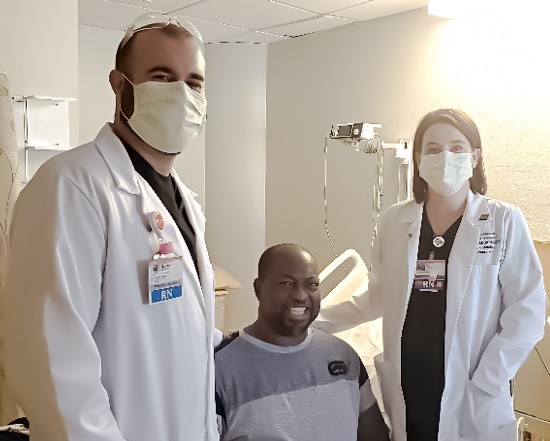
Kidney Transplant Program: From Evaluation to Recovery at St. Joseph's
Supporting Kidney Transplant Patients Every Step of the Way
* Support Network - Liver and kidney transplant support group for patients and their caregivers held every month via Zoom
Your Journey to a Healthier Life Starts Here
Just as Norton Thoracic Institute’s lung transplant program has ascended to national and regional recognition, Norton’s liver and kidney transplant programs are making a similar ascent, thanks to the same patient-first culture of excellence and industry-besting outcomes.
Our kidney transplant program at Dignity Health St. Joseph's Hospital and Medical Center is certified with the United Network for Organ Sharing (UNOS) and the Centers for Medicare and Medicare Services. We use a multidisciplinary team approach to transplant care and take a whole-body approach to kidney disease, investing both in the prevention and treatment of early-stage disease as well as the management of end-stage disease.
Giving the Gift of Life: Learn About Kidney Donation
At Dignity Health St. Joseph's Hospital and Medical Center, we also recognize the vital role of kidney donation in saving lives. We offer comprehensive resources and support for individuals interested in becoming living kidney donors. Learn about the kidney donation process and how you can make a life-changing difference.
Kidney Transplant: Is It the Best Treatment for Kidney Failure?
Kidney failure, also known as end-stage renal disease (ESRD), occurs when your kidneys can no longer effectively filter waste from your blood. Located just below the rib cage near the spine, healthy kidneys perform this vital function by producing urine. When kidney function declines, waste builds up, leading to serious health problems.
While dialysis offers a life-sustaining treatment option by artificially filtering the blood, kidney transplantation may provide a longer-term and potentially higher-quality-of-life solution for some patients with kidney failure. A kidney transplant involves surgically replacing the diseased kidneys with a healthy kidney from either a deceased donor or a living donor.

Benefits of Kidney Transplant vs. Dialysis
When facing kidney failure (also known as end-stage renal disease or ESRD), patients typically have two primary treatment options: dialysis and kidney transplantation.
Dialysis, a life-sustaining treatment, uses a medical device to filter the blood, removing waste products, excess fluids, and toxins when the kidneys can no longer perform this function effectively. While dialysis provides essential support, it requires frequent and time-consuming sessions, often impacting a patient's quality of life.
Kidney transplantation, may offer a longer-term and potentially higher-quality-of-life solution. A kidney transplant involves surgically replacing the diseased kidneys with a healthy kidney from a deceased or living donor.
The benefits of kidney transplant verse dialysis may be significant. Immediately following a successful kidney transplant, especially from a living donor, the new kidney begins filtering toxins, sometimes within hours. This can lead to a rapid improvement in overall health. Complications associated with kidney failure, such as anemia, high blood pressure, and fluid retention, may be reversed or significantly slowed.
Furthermore, kidney transplant recipients may experience increased energy levels, greater freedom and independence, and the elimination of the need for regular dialysis treatments. Choosing between dialysis and kidney transplant is a significant decision. Understanding the potential benefits of kidney transplantation is crucial for making an informed choice with your care team and loved ones.
Kidney Transplant Services in Arizona: Patient-First Care at Norton Thoracic Institute
At Norton Thoracic Institute's Transplant Center, we understand the challenges of living with end-stage renal disease (ESRD). Our dedicated team provides comprehensive, patient-centered kidney transplant services throughout Arizona, guiding you every step of the way.
We prioritize a collaborative approach, working closely with referring physicians, patients, and their families to ensure the best possible outcomes. From initial evaluation to lifelong care, we're committed to your well-being.
Schedule a consultation today to learn more.

Why Choose Norton's Transplant Center for Your Kidney Transplant?
- Experienced Transplant Specialists: Our team includes board-certified transplant nephrologists and surgeons who are among Arizona's most experienced.
- Comprehensive, Personalized Care: Our patients receive individualized attention from a multi-disciplinary team, including nephrologists, nurse practitioners, nurses, dietitians, social workers, psychiatrists, and financial coordinators. Each patient is assigned a nurse transplant coordinator, who guides the patient and family through the transplant process which includes evaluation, waiting for an organ, donor match, surgery and recovery.
- Multi-Organ Transplant Expertise: We offer expertise in complex cases, including simultaneous liver-kidney transplants.
- Streamlined Care Coordination: We expedite care coordination and ease the stress of the transplant evaluation process.
- Financial Assistance and Insurance Coverage: We work with contracted payers, including AHCCCS, Mercy Care, Medicare, and many popular commercial plans, to help patients access the care they need.
Learn More About Kidney Transplantation at St. Joseph's in Arizona
Call today to learn more about our comprehensive kidney transplant program at Norton Thoracic Institute at St. Joseph's Hospital and Medical Center in Phoenix, Arizona. We are committed to providing exceptional care and achieving the best possible outcomes for our patients, and our dedicated transplant coordinators are available to answer your questions and guide you through the process.
*Support Network - Liver and kidney transplant support group for patients and their caregivers held every month via Zoom


